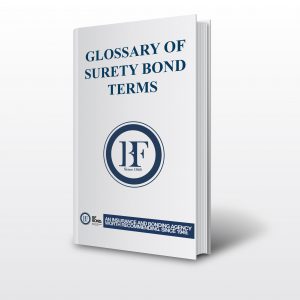
GLOSSARY OF SURETY BOND TERMS
SURETY BOND: An agreement providing for monetary compensation should there be a failure to perform specified acts within a stated period. ACCOUNTING METHODS: For construction or building contractors, the two methods of accounting, both realistic and preferred by surety companies, are (a) the Completed Contract method, and (b) the Percentage-of-Completion method.
ADMINISTRATOR: A fiduciary appointed by a probate court to manage or distribute the assets of an estate of a person who died without leaving a will.
ADMINISTRATOR CUM TESTAMENTO ANNEXO OR WITH WILL ANNEXED: One appointed by a probate court to administer the estate where the deceased left a will but failed to name an executor or the one named as executor fails to qualify.
ADMINISTRATOR, CUM TESTAMENTO ANNEXO, DE BONIS NON: One appointed by a probate court to succeed an executor who has died, resigned, or been discharged before the administration is complete.
ADMINISTRATOR DE BONIS NON: One appointed by a probate court to succeed an administrator who has died, resigned or been discharged before the administration is complete.
ADMINISTRATOR PENDENTELITE: One appointed to preserve the assets of a decedent’s estate where the will is contested or other circumstances occur which delay qualification of an executor if there is a will or the appointment of an administrator if there is no will.
ADVANCE PAYMENT BOND: Guarantees repayment or liquidation by the principal of moneys advanced in connection with a construction or supply bond or other type of contract.
AGGREGATE LIABILITY CLAUSE: A clause in a third party license bond which limits the surety’s liability to the bond penalty regardless of the number of claims made against the bond.
ALCOHOL BOND: A general term describing a bond given in compliance with federal or state laws or regulations governing the sale, manufacture or warehousing of alcohol for beverage or non-beverage purposes. Where the alcohol is intended for beverage purposes, the bond is frequently referred to as a liquor bond or intoxicating liquor bond.
ANNUAL BOND: One written to cover contractors or bids awarded or submitted during an annual period or for a period terminating within a fiscal year.
APPEAL BOND: One filed in court by a party against whom a judgment has been rendered, in order to stay execution of the judgment pending appeal to a higher court, in hope of reversing the judgment. The bond guarantees that the judgment will be paid if the appeal fails.
APPLICATION: A questionnaire which must be completed, when required, by an applicant for a bond. It gives the company information about the applicant and contains his/her agreement to indemnify the surety in the event of loss, as well as his/her promise to pay the premium.
ASSETS: The items on a balance sheet showing the book value of property owned. For a surety this could include all funds, property, securities, etc., or the property of an estate, whether real or personal.
ATTACHMENT BOND – PLAINTIFF’S: Attachment is taking a defendant’s property into custody by a summary process from the court in advance of the trial on the merits of the case. It is taken as security for the payment of any judgment that may be recovered by the plaintiff in the action. Attachment is allowed only where the plaintiff alleges a statutory ground for it (e.g. defendant is a nonresident or is about to leave the jurisdiction or remove or conceal his/her property). The bond, which the plaintiff is required to furnish, provides for indemnity to the defendant against loss or damage in case it is finally decided that a statutory ground did not exist or the plaintiff fails to recover a judgment against the defendant.
ATTACHMENT – DEFENDANT’S BOND TO DISCHARGE OR RELEASE: When an attachment has been issued, a defendant may discharge the attachment by giving the bond conditioned for the payment of any judgment that may be rendered against him/her in the action, with interest and costs.
BID BOND: Given by a bidder for a supply or construction contract to guarantee that the bidder, if awarded the contract within the time stipulated, will enter into the contract and furnish the prescribed performance bond. Default will ordinarily result in liability for the difference between the amount of the principal’s bid and the bid of the next low bidder who can qualify for the contract. In any event, however, the liability of the surety is limited to the bid bond penalty.
BLANKET FIDELITY BOND: A bond which covers loss of money, merchandise, or other property owned by the insured or in which he/she has a pecuniary interest when such loss is due to dishonesty of his/her employees. All employees are covered under the bond unless specifically excluded.
BLANKET POSITION BOND: A blanket fidelity bond which covers all of the insured’s employees for a uniform amount on each so that if loss is caused by dishonest or fraudulent acts of two or more employees in collusion, recovery up to the amount of the bond may be made on each identifiable participating employee.
BLUE SKY BONDS: Many states control the sale of securities under regulations known as Blue Sky Laws. These laws are designed to prohibit the sale of worthless securities. The bonds required of security dealers indemnify purchasers against loss caused by false representations. The term Blue Sky Law originated when a court complained that certain stock was backed only by the blue sky.
BOND: Generally speaking, it is an agreement whereby one party, called the surety, obligates itself to a second party, called the obligee, to answer for the default of a third party, called the principal.
CANCELLATION CLAUSE: A clause in a bond which permits the surety to terminate its future liability by serving written notice upon the obligee.
CLAIMANT’S BOND: In cases where, pending final decision on the merits, property is released to one not a party to the litigation, who claims to be the owner thereof. The claimant may be required to give bond conditioned for the return or redelivery of the property if ordered to do so by the court.
CO-FIDUCIARY: One who serves as a fiduciary jointly with another, such as a co-administrator, co-executor, co-guardian, etc.
COLLATERAL: Anything of value pledged with the surety to secure it against loss by reason of default of the principal.
COLLUSIVE LOSS: A loss caused by two or more dishonest employees acting in consort.
COMMERCIAL BLANKET BOND: A blanket fidelity bond issued in a stated amount on all regular employees of commercial establishments covering against loss from employees’ dishonest acts.
COMMISSIONER OF INSURANCE: The official charged with enforcement of the laws pertaining to insurance in his/her state. In some jurisdictions this official is called the superintendent or director of insurance.
COMMITTEE: One appointed by a court to manage the estate of a person who has been declared incompetent. Also known as conservator or a curator.
COMPLETION BOND: One covering performance of a construction project that names as an obligee a lender or similar party in a position to invoke the performance features of the bond for its benefit without an obligation to provide funds or to complete.
CONDITION: The technical name of one of the four parts of a bond. The condition is not a qualification of coverage as with an insurance policy, but is the essence of the guarantee.
CONSERVATOR: A person, official, or institution designated to take over and protect the interests of an incompetent.
CONTINUITY CLAUSE: The clause in a bond, or rider attached to a bond, under which that bond, subject to its terms, assumes liability for any loss due to acts which occurred while a prior bond was in force, but which were not discovered until after the expiration of the discovery period of the prior bond.
CONTRACT BOND: A guarantee of the faithful performance of a construction contract and usually the payment of all labor and material bills related to it. In those situations where two bonds are required – one to cover performance and the other to cover payment of labor and materials – the former is known as a performance bond, and the latter as a payment bond.
CONTRACT PRICE: The whole sum of money which passes from an owner to contractor when final settlement is made between the two under the contract, the basis for the premium charge on most types of construction and supply contract bonds.
CONVERSION: The wrongful taking of property entrusted to one’s care.
CORPORATE SURETY: A corporation licensed under various insurance laws, which under its charter, has legal power to act as surety for others.
COST BOND: One required of a litigant conditioned for the payment of the costs of the litigation, such as fees of the court clerk, sheriff, etc.
CO-SURETY: One or two or more surety companies directly participating in a bond. Their obligation to the owner is joint and several, but often a limit of liability for each surety is stated as between themselves.
COUNTERSIGNATURE: A signature of a licensed domiciled agent or representative required by the laws of some states to validate the bond.
COURT BONDS: A general term embracing all bonds and undertakings required of participants in a lawsuit permitting them to pursue certain remedies in the courts.
CUMULATIVE LIABILITY: The aggregate amount of two or more bonds in behalf of the same principal (or in the case of fidelity or blanket bonds, in favor of the same obligee) filed in succession, where the succeeding bond(s) does not extinguish the liability under the prior bond(s) or the liability of the surety is the penalty of the bond times the number of years in force.
CUSTOMS BONDS: These bonds guarantee the payment of import duties and taxes, and compliance with regulations governing the entry of merchandise from foreign countries into the United States.
DEDUCTIBLE: An amount which is to be “deducted” from any loss and which the insured agrees to bear personally.
DEPOSITORY BOND: This guarantees repayment of moneys deposited with a bank in the event of the failure or insolvency of the bank. While this is now a negligible line of surety business, it was once a large one. The Federal Deposit Insurance Corporation (FDIC) now guarantees the payment of bank deposits.
DEPOSITORY LIABILITY: A public official is liable for public funds which he/she deposits in a bank and cannot pay over because of insolvency or failure of the bank. In many states, statutes provide for the designation of depositories for public funds and for the furnishing of collateral security by such depositories. Such laws, if interpreted strictly, usually exempt the public official and his/her surety from liability for loss through failure of any of the designated and qualified depositories.
DEPOSIT PREMIUM: The advance premium required by a surety company on those forms of bonds which are subject to premium adjustment.
DISCOVERY BOND: A form of fidelity bond which covers against dishonest or fraudulent acts of employees, provided such loss is discovered any time after the bond becomes effective and before it is terminated, irrespective of when the dishonest or fraudulent acts were committed.
DISCOVERY PERIOD: Under certain bonds and policies, provision is made to give the insured a period of time after the cancellation of a contract in which to discover whether a loss was sustained that would have been recoverable had the contract remained in force. This period usually varies from six months to three years. The period may be determined by statute; in certain bonds, it is of indefinite duration because of statutory requirement.
DISHONESTY INSURANCE: A generic term describing fidelity bond coverage guaranteeing against loss caused by dishonest officers or employees of a commercial firm or by dishonest public officials or employees.
EARNED PREMIUM: The premium amount which would compensate the surety for the protection furnished for the expired portion of the term of the bond.
EFFECTIVE DATE: The date from which bond coverage is provided.
ENDORSEMENT: A form attached to the bond to add to, alter, or vary its provisions. Sometimes called a rider.
EXCESS BOND: Additional coverage over a primary bond protecting against certain perils (usually dishonesty) applying only to loss above a specified amount.
EXCLUSION: A provision in a bond referring to perils or property not covered.
EXECUTOR: One named in a will to distribute and settle the estate of the testator.
EXPENSE RATIO: The percentage of the premium used to pay all costs of acquiring, writing, and servicing the bond.
EXPERIENCE: The loss record of either an individual or a class of coverage.
EXPERIENCE RATING: A plan available for fidelity bonds whereby surcharges or discounts are applied to premiums developed by those risks based on the actual past experience of such risks.
EXPIRATION: The date upon which a bond will cease to provide coverage unless previously cancelled.
FAITHFUL PERFORMANCE BOND: A type of bond where the coverage goes beyond protection against loss due to dishonesty or fraudulent acts of the principal; it provides protection to the named insured against loss by reason of the failure of the persons covered hereunder to faithfully perform their duties as prescribed by law or by the constitution and bylaws of the insured or their equivalent.
FIDELITY BOND: A bond which will indemnify an insured for loss caused by a dishonest act or fraudulent act of an employee covered under the bond. Also known as dishonesty insurance.
FIDUCIARY: A person who occupies a position of trust, particularly one who manages the affairs or funds of another.
FIDUCIARY BOND: Required of administrators, executors, guardians, committees, etc., guaranteeing faithful performance of duty in accordance with the laws applicable to the trust. Frequently called a probate bond because the bond is customarily filed in a probate court.
FINANCIAL GUARANTEE BOND: A bond that guarantees payment of a sum of money whether or not the exact amount is known or stated. Common types are: court bonds (appeal, etc.), lease bonds which guarantee payment of rent, etc.
FINANCIAL RESPONSIBILITY LAW: A statute requiring motorists to furnish, either before or after an accident, evidence of ability to pay damages. Such evidence may be furnished by a surety bond.
FINANCIAL STATEMENT: A balance sheet which the surety requires of an applicant for a bond (particularly a contractor), setting forth his/her financial position as of a given time or period.
FIXED PENALTY BOND: A bond for which the amount is expressed in terms of a stated and definite sum of money.
FORFEITURE BOND: A bond where the full penalty is payable upon breach of the condition regardless of the amount of loss or damage.
GARNISHMENT – BOND TO DISCHARGE OR RELEASE: When money or property belonging to a defendant has been attached while in the hands of a third party, the proceeding is called a garnishment and the third party is called the garnishee. The bond is similar to a release of attachment bond.
GROSS LOSS: The amount of loss before giving effect to reinsurance. Usually reported inclusive of claim expenses. It may also be considered as the loss without allowance for collection of salvage.
GUARDIAN AD LITEM: One appointed to preserve the assets of the estate of a minor during a litigation which delays the appointment of a general guardian.
GUARDIAN OR GENERAL GUARDIAN: A fiduciary appointed by the court to administer the estate of a minor.
HAZARD: A term applied to certain conditions which may create or increase the probability of a loss, because of a given peril.
HOLD-OVER PUBLIC OFFICIALS: Those who are elected or appointed to succeed themselves in office or who continue beyond the limits of their terms until their successors are appointed or elected.
IMMIGRANTS BOND: A class of federal bonds covering aliens who enter the United States legally.
INCOME TAX BONDS: These are given to guarantee payment of federal income taxes due or claimed to be due. They are direct financial guarantees and collateral usually is required.
INDEMNIFY: To compensate for actual direct loss sustained under a bond. There can be no recovery on a bond until the obligee has actually suffered a loss.
INDEMNITOR: One who enters into an agreement with a surety company to hold the surety harmless from any loss or expense it may sustain or incur on a bond issued on behalf of another.
INDEMNITY BOND: A general term describing any bond which protects the obligee against direct loss which may arise as a result of failure on the part of a principal to perform.
INDEMNITY TO SHERIFF OR MARSHAL: A sheriff or marshal, in the execution of the process of the courts, may incur liability for damage to a third party through an act or acts which turn out to be wrongful. Either official when requested to take some particular action, may require a bond of the party making the request. The bond covers the liability of the sheriff or marshal in that connection.
INDIVIDUAL FIDELITY BOND: A bond covering a single employee for a specified amount to protect the employer in the event of the employee’s dishonesty.
INJUNCTION – PLAINTIFF’S BOND TO SECURE: An injunction is a judicial process whereby the defendant is required to do or refrain from performing a particular act. An order granting an injunction may be on the condition that the plaintiff furnish a bond to indemnify the defendant against loss in case it is decided that the injunction should not have been granted.
INJUNCTION – DEFENDANT’S BOND TO DISSOLVE: When an injunction has been issued, the court may order the injunction dissolved upon the giving of a bond. The bond guarantees payment the plaintiff may sustain as a result of the performance of the act or acts originally enjoined. It is then the privilege of the defendant to proceed as if the injunction had never been issued.
INSURING CLAUSE: That part of a bond or policy which recites the agreement of the insurer to protect the insured against some form of loss or damage. Also known as an insuring agreement.
INTESTATE: One who dies without a legal will.
INTERNAL REVENUE BONDS: A class of federal bonds which guarantee compliance of producers of distilled spirits, tobacco, etc., with applicable laws and regulations, as well as the payment of taxes.
JOINT CONTROL: An arrangement by written agreement between a fiduciary and a surety, acknowledged by the bank in which funds are deposited or securities lodged so that the funds or securities are controlled by both parties; usually all checks are required to be signed by the fiduciary and countersigned by an authorized representative of the surety and access to the securities can be had only in the presence of an authorized representative of the surety.
JOINT VENTURE: A joining of the financial resources and skills of several contractors to undertake contracts of construction too large for their individual and separate abilities.
JUDICIAL BOND: A general term applied to all bonds filed in court.
LABOR AND MATERIAL BOND: A bond given by a contractor to guarantee payment for the labor and material used in the work which he/she is obligated to perform under the contract. This liability may be contained in the performance bond, in which case a separate labor and material bond (payment bond) is not given.
LIABILITY: This is a broad term denoting any legally enforceable obligation.
LIBEL – BOND TO DISCHARGE OR RELEASE: When a warrant for the seizure of a ship has been issued, the marshal is required to stay execution of the process, or discharge the ship if process has been levied, on receiving from the owner of the ship a bond or stipulation conditioned to comply with the decree of court in the action.
LICENSE BOND: Used interchangeably with the term “permit bond” to describe bonds required by state law, municipal ordinance or regulation, to be filed prior to the granting of a license to engage in a particular business or a permit to exercise a particular privilege. Such bonds provide payment to the obligee for loss or damage resulting from violations by the licensee of the duties and obligations imposed upon him/her.
LIEN: A charge upon real or personal property for the satisfaction of a debt.
LIMIT OF LIABILITY: The maximum amount which a surety company will pay in case of loss. Sometimes called the bond penalty.
LOSS RATIO: The percentage of losses to premiums.
LOST INSTRUMENT BOND: A bond given by the owner of a valuable security (stock, bond, promissory note, certified check, etc.) which is alleged to have been lost or destroyed. It protects the issuer of the security against loss which may result from the reinsurance of a duplicate or, in some instances, payment of cash value thereof.
MAINTENANCE BOND: The normal coverage provided by a maintenance bond is a guarantee against defective workmanship or materials. However, maintenance bonds sometimes incorporate an obligation guaranteeing “efficient or successful operation” or other obligations of like intent and purpose.
MECHANICS LIEN – BOND TO DISCHARGE: A lien against real estate may be filed for an amount claimed to be due for labor or materials furnished for the construction of a building or other improvement upon the property. Pending final determination of the owner’s liability, the owner may discharge the lien by giving bond conditioned for the payment of any amount that may be found due to claimant with interest and costs.
MINIMUM PREMIUM: The least amount a surety company may charge for a particular bond for a designated period.
MISCELLANEOUS INDEMNITY BONDS: Bonds which do not fit any of the well recognized divisions or subdivisions.
MORAL HAZARD: The possibility of loss caused or accentuated by dishonesty or carelessness of the insured or others.
NAME SCHEDULE BOND: A fidelity bond which covers the employees listed in a schedule, each for a specified amount.
OBLIGEE: The party in whose favor a bond runs; the party protected by the bond against loss. An obligee may be a person, firm, corporation, government, or an agency of a government.
OBLIGOR: Sometimes called the principal, or one bound by the obligation. Under a surety bond, both principal and surety are in a sense, obligors, since the surety must answer if the principal defaults.
OPEN DEFAULT BOND: Where a judgment has been entered by default, the defendant may, under certain circumstances, have the case reopened and tried on its merits, upon giving a bond conditioned for the payment of any judgment that may be rendered in the action.
OPEN PENALTY BOND: A surety bond written without a limit on the liability of the principal or surety. Under the regulations of the federal government and the laws of many of the states, surety companies are not permitted to obligate themselves on any one bond for an amount greater than a specified percentage of their capital and surplus (qualifying power).
OUTSIDE EMPLOYEE: An employee, such as a salesmen, messenger, etc. whose duties keep him/her away from his/her headquarters.
PENAL SUM: The maximum amount for which a surety company may normally be held liable under the bond. Also called the bond penalty. See also limit of liability.
PERFORMANCE BOND: A bond which guarantees faithful performance of the terms of a written contractor for furnishing supplies or for construction of all kinds. Performance bonds frequently incorporate payment bond (labor and materials) and maintenance bond liability.
PERSONAL SURETY: An individual who acts as surety for another, who may or may not charge a fee for his/her guarantee, and usually is not regulated by any government agency, such as is the corporate surety.
PETITIONING CREDITORS’ BOND: When a petition is filed to have a person adjudged a bankrupt, an application is made to have a receiver or a marshal take charge of the property of the alleged bankrupt prior to the adjudication, the petitioners are required to give bond to indemnify the alleged bankrupt for such costs, counsel fees, expenses, and damages as may be occasioned by such seizure, in case the petition be dismissed or withdrawn by the petitioners.
POSITION SCHEDULE BOND: A fidelity bond which covers employees who may, while the bond is in force, occupy and perform the duties of the positions scheduled in the bond, each position being covered for a specific amount.
POWER OF ATTORNEY: The authority given one person or corporation to act for and obligate another, to the extent set forth in the instrument creating the power.
PREMIUM: The fee to be paid for the bond. The cost of the bond.
PRINCIPAL: The one who is primarily bound on a bond furnished by a surety company.
PROBATE BOND: One that guarantees an honest accounting and faithful performance of duties by administrators, trustees, guardians, executors, and other fiduciaries. So called because such bonds are customarily filed in a probate court. Also known as fiduciary bond.
PRO RATE CANCELLATION: Cancellation of a bond when the portion of the premium returned is the full proportionate part due for the unexpired period. Distinguished from short rate cancellation.
PUBLIC OFFICIAL BOND: A bond that guarantees faithful performance of duty of a public official in a position of trust; also provides for an honest accounting of all public funds handled by him/her. Such bond is given to comply with a statute and, therefore, carries whatever liability the statute imposes.
QUALIFYING POWER: The largest net amount of risk which may be carried by a surety company on a bond.
RATE: The cost of a unit of bond coverage. Such unit is usually in the denomination of $1,000.
RATE MANUAL: A book published by the Surety Association of America or by individual surety companies giving rates and classifications for bonds.
RECITAL: That portion of a surety bond usually commencing with the word “Whereas” which describes the transaction for which the bond is given. In the case of a guarantee of a contract it generally incorporates the contract by reference.
RECOVERY: Reimbursement received by a surety from a reinsurer, or by a subrogation, or from salvage following a loss.
REFUNDING BOND – RATE LITIGATION: This term is applicable to any bond conditioned for future return, if ordered, of money which the principal was allowed to charge and retain pending final determination or decision in a contested matter.
REMOVAL BOND: Where a case originally brought in a state court is removed to the federal court, the defendant is required to give bond for the payment of costs in federal court if the case is found to have been improperly removed. Similar bonds may be required on removal of a case from one state court to another.
REPLEVIN – PLAINTIFF’S BOND TO SECURE: Replevin is an action to recover possession of specific articles of personal property. The replevin bond, which the plaintiff is required to furnish, is conditioned for the return of the property, if return is ordered, and for the payment of all costs and damages adjudged to the defendant.
REPLEVIN – DEFENDANT’S BOND TO RECOVER PROPERTY REPLEVIED: Where personal property has been replevied, the defendant may, by the furnishing of a bond, regain possession of the property, pending final decision on the merits. The bond is conditioned for redelivery of property to the plaintiff, if ordered to do so, or otherwise to comply with a court order or judgment.
RETROACTIVE RESTORATION: A provision in a bond whereby, after payment of a loss, the original amount of coverage is automatically restored to take care of undiscovered losses as well as future losses.
RIDER: A printed form of special provision added to a bond. Sometimes called an endorsement.
SALVAGE: That which is recovered from the principal or an indemnitor to offset in whole or in part the loss and expense incurred by a surety in satisfying obligations it has sustained under a bond.
SCHEDULE BOND: One that covers loss resulting from dishonest or fraudulent acts of employees who are listed either by name or by positions scheduled in the bond.
SEQUESTRATION BOND: Substantially the same as Attachment Bond – Plaintiff’s.
SHORT RATE – SHORT RATE CANCELLATION: The charge required for bonds taken for less than a year, and in some cases, the earned premium for bonds cancelled by the insured before the end of the term of the bond; i.e., the earned premium plus an expense charge.
SHORT TERM BONDS: Those covering fiduciaries whose duties are to collect the assets of the decedent, pay the debts, and distribute the remainder according to law. These bonds are usually less than two years duration.
STATUTORY BOND: A term generally used describing a bond given in compliance with a statute. Such a bond must carry whatever liability the statute imposes on the principal and the surety.
STAY OF EXECUTION: A bond to stay or suspend execution on a judgment. It guarantees the payment of the judgment upon termination of the stay.
SUBCONTRACT BOND: One required by a general contractor of a subcontractor, guaranteeing that the subcontractor will faithfully perform the subcontract in accordance with its terms and will pay for labor and material incurred in the prosecution of the subcontracted work.
SUBDIVISION BOND: Many municipalities provide by ordinance that a developer who undertakes to lay out a housing or industrial subdivision shall give bond with surety to guarantee that, within a specified time, improvements on the property, such as streets, sidewalks, curbs, gutters, and sewers will be constructed.
SUBROGATION: The legal or equitable process by which a surety company obtains from a third party recovery of an amount paid out by the surety to the obligee or a claimant under the bond.
SUPERSEDEAS BOND: This is a bond to supersede or take the place of a judgment, and coverage is substantially the same as under a defendant’s appeal bond.
SUPERSEDED SURETYSHIP: When a company writes a bond to take the place of another bond which is cancelled on the effective date of the new bond, a rider is generally attached (unless the bond itself contains a superseded suretyship provision) agreeing to pay losses that would have been recoverable under the first bond except for the expiration of the discovery period.
SUPPLY BOND: A bond which guarantees faithful performance of a contract to furnish supplies or materials. In the event of a default by the supplier, the surety must indemnify the purchaser of the supplies against the loss occasioned thereby.
SURETY BOND: An agreement providing for monetary compensation should there be a failure to perform specified acts within a stated period.
SURETYSHIP: Refers to obligations to pay the debts of, or answer for, the default of another. It assumes a legal relationship based upon the contract in which one person (the surety) undertakes to answer to another (the obligee) for the debt, default, or miscarriage of a third person (the principal) resulting from the third person’s failure to pay or perform as required by an underlying contract.
TERM: A period of time for which a bond is issued.
TESTATOR: One who makes a will.
THIRD PARTY BOND: A license bond which gives parties other than the named obligee a right of action in their own name to recover loss or damage resulting from a breach by the licensee of his/her obligations under the law, ordinance or regulations under which the bond is required.
TREASURY LIMITS: These are qualifying limits imposed upon surety companies by the United States Treasury Department.
TRUSTEE: One named in a will or deed of trust to manage property for the benefit of another.
UNDERWRITER: An officer or employee of a surety company who has the responsibility for accepting risks.
PLEASE NOTE:
This document is provided for informational purposes ONLY and is not intended to serve as legal advice and is no substitute for consulting legal counsel.


 Who Must Have a Secondhand Dealer General License?
Who Must Have a Secondhand Dealer General License?


